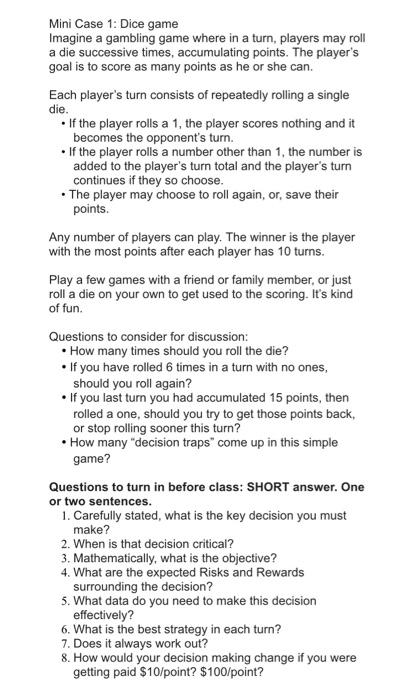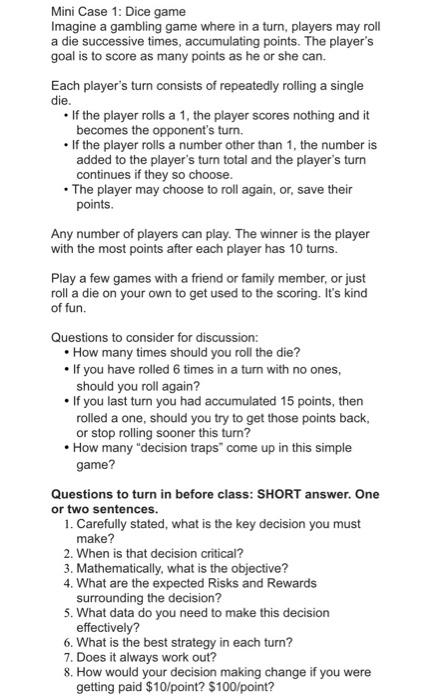Mini Case 1: Dice game Imagine a gambling game where in a turn, players may roll a die successive times, accumulating points. The player's goal is to score as many points as he or she can. Each player's turn consists of repeatedly rolling a single die. - If the player rolls a 1 , the player scores nothing and it becomes the opponent's turn. - If the player rolls a number other than 1 , the number is added to the player's turn total and the player's turn continues if they so choose. - The player may choose to roll again, or, save their points. Any number of players can play. The winner is the player with the most points after each player has 10 turns. Play a few games with a friend or family member, or just roll a die on your own to get used to the scoring. It's kind of fun. Questions to consider for discussion: - How many times should you roll the die? - If you have rolled 6 times in a turn with no ones, should you roll again? - If you last turn you had accumulated 15 points, then rolled a one, should you try to get those points back, or stop rolling sooner this turn? - How many "decision traps" come up in this simple game? Questions to turn in before class: SHORT answer. One or two sentences. 1. Carefully stated, what is the key decision you must make? 2. When is that decision critical? 3. Mathematically, what is the objective? 4. What are the expected Risks and Rewards surrounding the decision? 5. What data do you need to make this decision effectively? 6. What is the best strategy in each turn? 7. Does it always work out? 8. How would your decision making change if you were getting paid $10 /point? $100 /point? Mini Case 1: Dice game Imagine a gambling game where in a turn, players may roll a die successive times, accumulating points. The player's goal is to score as many points as he or she can. Each player's turn consists of repeatedly rolling a single die. - If the player rolls a 1 , the player scores nothing and it becomes the opponent's turn. - If the player rolls a number other than 1 , the number is added to the player's turn total and the player's turn continues if they so choose. - The player may choose to roll again, or, save their points. Any number of players can play. The winner is the player with the most points after each player has 10 turns. Play a few games with a friend or family member, or just roll a die on your own to get used to the scoring. It's kind of fun. Questions to consider for discussion: - How many times should you roll the die? - If you have rolled 6 times in a turn with no ones, should you roll again? - If you last turn you had accumulated 15 points, then rolled a one, should you try to get those points back, or stop rolling sooner this turn? - How many "decision traps" come up in this simple game? Questions to turn in before class: SHORT answer. One or two sentences. 1. Carefully stated, what is the key decision you must make? 2. When is that decision critical? 3. Mathematically, what is the objective? 4. What are the expected Risks and Rewards surrounding the decision? 5. What data do you need to make this decision effectively? 6. What is the best strategy in each turn? 7. Does it always work out? 8. How would your decision making change if you were getting paid $10 /point? $100 /point








